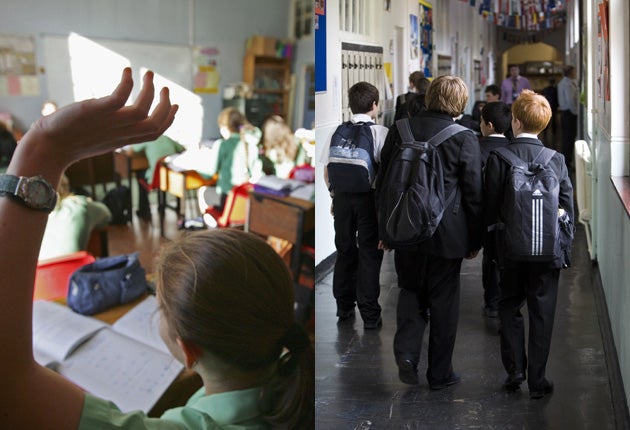Why single-sex schools are bad for your health (if you're a boy)
Boys taught in male-only schools face divorce and depression by their early 40s, research reveals

Your support helps us to tell the story
From reproductive rights to climate change to Big Tech, The Independent is on the ground when the story is developing. Whether it's investigating the financials of Elon Musk's pro-Trump PAC or producing our latest documentary, 'The A Word', which shines a light on the American women fighting for reproductive rights, we know how important it is to parse out the facts from the messaging.
At such a critical moment in US history, we need reporters on the ground. Your donation allows us to keep sending journalists to speak to both sides of the story.
The Independent is trusted by Americans across the entire political spectrum. And unlike many other quality news outlets, we choose not to lock Americans out of our reporting and analysis with paywalls. We believe quality journalism should be available to everyone, paid for by those who can afford it.
Your support makes all the difference.You might have thought that boys brought up in a single-sex environment would find relationships with girls difficult to handle.
Now research due to be published tomorrow proves it.
It shows that boys taught in singlesex schools are more likely to be divorced or separated from their partner than those who attended a mixed school by their early 40s.
However, those who stayed together were just as likely to be happy in their relationship as men educated in mixed schools – when asked to rate the quality of their marriage on a scale of one to seven.
The findings, taken from studying a cohort of all those born in a single week of 1958, will be presented by Professor Diana Leonard, from London University's Institute of Education, at a conference at the Perse School for Girls in Cambridge.
The research covered 17,000 adults who had been taught in a range of institutions from private boarding schools to state comprehensives. The majority had been brought up in day schools.
Dr Leonard's findings have fuelled claims from teachers' leaders and education psychologists that boys brought up in a single-sex environment are less able to relate to the opposite sex than those taught in a co-educational school.
Mary Bousted, general secretary of the Association of Teachers and Lecturers, said: "All the research shows single-sex schools are good for girls but bad for boys – both in terms of academic performance and socialisation.
"Girls seem to learn what the nature of the beast is if they have been to single sex schools whereas boys taught on their own seem to find girls more puzzling."
Dr Bousted added: "Boys learn better when they are with girls and they actually learn to get on better."
The research also reveals that men taught in boys' schools are more likely to suffer from "a sense of malaise" or depression by their early 40s – possibly as a result of relationship breakdown.
Men were also more likely to have spoken of a "dislike" for their school days if taught in a male-dominated environment.
However, there was no difference in the likelihood of marital breakdown between girls brought up in single-sex schools and those taught in a mixed-sex environment.
The research also shows that boys from single-sex schools were just as likely to take part in household chores – such as cooking the evening meal, laundry, cleaning and shopping.
"We found no link between single-sex schooling and the domestic division of labour," Professor Leonard will say.
The research failed to back up a claim made by advocates of mixed schooling that being taught co-educationally meant youngsters were less likely to opt for a homosexual or lesbian lifestyle. "Only 21 men and 22 women reported living with same-sex partners at age 42," says the research.
"We are therefore unable to comment on whether co-education did provide the 'clean, healthy, natural atmosphere' so commended by its early advocates."
Nearly half of those born in the 1958 week under study, who subsequently graduated from universities, had attended single-sex schools, the research also found.
However, this was more likely to have been as a result of the type of schools they attended – there are more single private schools and grammar schools than comprehensives. Pupils taught in single-sex schools are more likely to study for subjects traditionally thought of as the preserve of the opposite sex, though.
For instance, more girls choose to study maths and science in single-sex schools and more boys pick the arts and humanities than if they were taught in mixed classes.
""A central finding is that single-sex schooling moderates the effect of gender-stereotyping in terms of choice of field of study," says the research.
"This runs counter to earlier assertions that co-education would widen subject choice."
More Education news:
Join our commenting forum
Join thought-provoking conversations, follow other Independent readers and see their replies
Comments